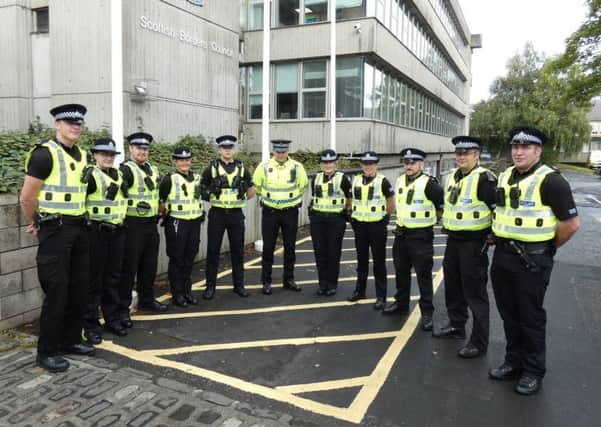New team out to step up crackdown on Borders’ troublemakers


A team of six police officers, overseen by a sergeant, will build on work already being undertaken by the region’s first such team, launched in April last year.
The seven officers making up the original team issued 884 parking tickets, clocked up 335 hours of foot patrols, conducted 217 drug searches and carried out 101 static road checks on vehicles during their first 12 months on the beat.
Advertisement
Hide AdAdvertisement
Hide AdThe teams, a joint initiative by Scottish Borders Council and Police Scotland to tackle antisocial behaviour and drug-related crime, will cost the local authority almost £550,000 this financial year.
Some £265,000 of that is being spent on the new team, with its predecessor costing £282,000.
Councillors are given regular updates on the team’s work and are able to respond to communities’ concerns by flagging them up to the teams.
A recent rise in antisocial behaviour in Hawick is already being targeted, for instance.
Advertisement
Hide AdAdvertisement
Hide AdHawick and Hermitage councillor George Turnbull, the council’s executive’s member for community safety, explained: “Each month, the community action team scrutiny board meets, and we have an analyst give data about what’s happened.
“After discussion with members and local police officers, we can then put the task into each specific area.
“Obviously, we need the engagement of the public to feed in problems that exist and then we can respond very quickly.
“What we’re trying to do is improve communication, so a list of contacts will be made for the two teams.
Advertisement
Hide AdAdvertisement
Hide Ad“Antisocial behaviour is a scourge on society and is fuelled by drugs and alcohol, but it’s encouraging that the council has now invested over £500,000 into the community action teams, and the response we’ve had since April last year has proved to be very successful indeed.
“When we launched the initial team, we made sure we collected as much evidence as possible to gauge its success.
“The statistics show they have made a real difference right across the area, and we are sure the second team will strengthen the positive impact the initial team is already making.”
Sergeant David Rourke is leading the new team, and he added: “This is a dedicated team which takes on tasks based on priorities that come in from local communities all around the region.
Advertisement
Hide AdAdvertisement
Hide Ad“Those priorities come in on a rolling basis and they are reviewed continuously throughout the year, to make sure that we’re tackling the issues that matter the most.”
Despite carrying out almost 220 personal drug searches, officers found drugs just over a third of the time.
Explaining that statistic, Mr Rourke said: “All our drug searches are intelligence-led, from dealing with people in the communities and from information, which is vital.
“Clearly, you’re not going to be successful on all occasions, but searches are targeted to specific intelligence. We’re not just going around searching any body.”
Advertisement
Hide AdAdvertisement
Hide AdWhen asked about low-level crime such as dog fouling and illegal parking, Mr Rourke said: “This is the whole purpose of the team. These are the things that matter most to local communities, particularly issues such as antisocial behaviour.
“This is stuff that is really important to communities and is something with which they approach councillors on a regular basis.
“I think it’s important that we are seen to be tackling these issues, not only from an intervention point of view but from a prevention one as well.
“I’m a resident of the Borders myself, and I think police officers being seen is a common theme. Communities like to see us on the street and they like to engage with police, and we like to engage with the public.”
Advertisement
Hide AdAdvertisement
Hide Ad“With regards to speeding, there are different types of training, there are traffic enforcement officers and there are static camera vans which can be set up at different points.
“We do have officers trained in the use of speed guns, but that will predominantly be within local towns and villages, within 30mph zones, and that’s what our officers will be focusing on.”
Although the second team, like its predecessor, will be seven-strong, it currently has two vacancies to fill.